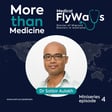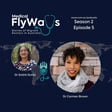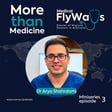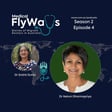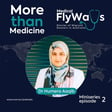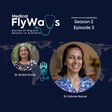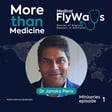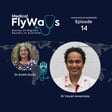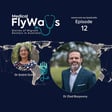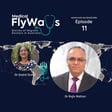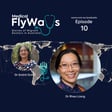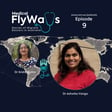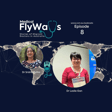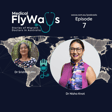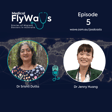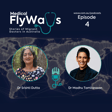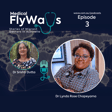Become a Creator today!Start creating today - Share your story with the world!
Start for free
00:00:00
00:00:01

Episode 6 - Dr Ritu Rana
Obstetrician, Gynaecologist and Fertility Specialist Dr Ritu Rana completed initial medical training in India before obtaining O&G training in the UK. With special interests in advanced laparoscopic surgery and fertility, Dr Rana currently runs a successful clinic in Mackay. in 2023, Dr Rana performed the first robot-assisted hysterectomy in Mackay using advanced surgical technology and focuses on delivering minimally-invasive treatments for her patients.
Recommended
Transcript
Introduction to 'Medical Flyways'
00:00:01
Speaker
Medical Flyways, the untold journeys of migrant doctors in Australia.
00:00:13
Speaker
Hello, Ritu. Thank you so much for being on the podcast with me today. I know you've woken up earlier than your usual, and this is early for me, too, at 6.30 in Queensland time. So can I please ask you to introduce yourself and tell us a little bit about yourself and where you work at the moment?
00:00:31
Speaker
Good morning, Shresthi, and thank you so much for having me here. My name is Dr. Ritu Rana, and I'm an obstetrician gynecologist working in a regional state called Queensland in Mackay. Not many people even in Australia know where it is in the map of Australia, but I'm sure being a Queenslander you do. I really don't mind waking up early because this is a perfect time, as we both agree, with kids being in bed.
00:00:55
Speaker
Oh, absolutely. I agree. Some me time as well. And a morning cup of tea made by husband. Awesome.
Dr. Rana's Career Journey
00:01:04
Speaker
ah Thank you so much, Ritu. Now, I should add that we both have had slightly similar journeys in terms of having now worked on three continents. So, like myself, you did your medical degree in India, and you've also worked in the UK and Australia, am I right?
00:01:20
Speaker
That's right. Yes. Can you share some of what that journey has been like for you so far? I'll try to wrap it up quickly, but the journey has been long. It's been nearly 25 years, so it's a long journey. ah started I wanted to be an engineer in school, but something happened. My dad was in the army. He met an ambush. Then I saw the doctors looking after him.
00:01:42
Speaker
And that inspired me to do medicine instead. And so that's why I went to do medicine. In the medical school I met my husband. We both wanted to do our higher training in England. But before going away, we wanted a strong background
Why Move to Queensland?
00:01:56
Speaker
in India. So we decided to do our post-graduation training first before we move for higher training.
00:02:02
Speaker
He did his MD in psychiatry. I did obstetrics and gynecology. I particularly wanted to do ups and gynae because i was in interested I had a keen interest in infertility in medical school. To be able to do that, I learned that we had to do ups and gynae first. There's no way around it, yes.
00:02:19
Speaker
So I did my medical degree, did my postgraduate training in ops and gynae and then we moved to the UK for higher training. I think we both were very lucky as well as diligent and continuously tried and got into training in the UK. So I finished my seven years of obstetrics and gynecology training in the yeah UK.
00:02:40
Speaker
My training extended to a total of nine years because I had two children during that time. And I took a year out to do my fellowship in IVF. So that made the seven years to nine years. By the end of those nine years, we realized that we needed to move, particularly because my son, who was then six, had a terrible eczema. So much so that he was on immunosuppressants. He was on methotrexate at that time for that. um And we felt that the weather in England, the cold weather, wasn't helping him.
00:03:09
Speaker
So we we started looking somewhere sunny. Our options were to go back to India, to go to Dubai, where our degrees and training would be recognized, or to go to Queensland, sunny Queensland. So on a balance, we thought Queensland is a good option. My husband got a job here. I applied to the public hospital here. I got a job. And
Settling in Mackay
00:03:30
Speaker
here we are, seven years later.
00:03:32
Speaker
Well, that's quite fascinating. And thank you for making it so succinct, although I'm sure there is a lot more nuance to what you've described. But interestingly, and I hope you don't mind, I share this here. When people have asked me, why did you choose Brisbane? I always said, oh, it's the weather. And I used to have to then explain. But we had similar reasons with my older one and having medical needs which required for us to come here. so It's interesting that so many of us have done the journey and have so many similarities in our experiences. so yeah so We landed in Brisbane and we've stayed here since. so Did you initially come to Australia and start in Queensland itself? and Why choose where you are now?
00:04:17
Speaker
So Makai unfortunately at that time had the highest suicide rate apparently in the country. They had sanctioned quite a few psychiatrist's jobs over here. So my husband started looking in Queensland and there were a few jobs that came up in Makai.
00:04:32
Speaker
One of our good friends from the UK who was also from the same medical school had applied in Mackay. So they discussed together and they both applied in Mackay where there were quite a few jobs. So he got a job here. He was applying to a few different places and for someone coming from outside it is easier to get a job in a regional place. At least it was at that time. So he took up that opportunity and we love this place so much that we've never thought about moving.
00:04:58
Speaker
Awesome. Now, obviously you started and came here after having done all of your training in the yeah UK and I've done a similar journey of being in the UK, training then, and then coming. Do you think the training in the UK in some way prepares us or in any way prepares us to do what we do or do it well in Australia when you come here?
00:05:20
Speaker
Absolutely. I think UK does not just train you very well. I think it also trains you in your way of life and how you behave in public situations. I certainly believe and I'm being biased that one of the best trainings in the world ah is provided in UK. But the other thing it tells you is how to ration your resources very well. NHS being NHS, it's a public sector. There are so many people who have to use limited amount of resources and you can't not do evidence-based practice and use your resources the best possible way. So I think it overall, it prepares you for working in a and also leading in a public hospital or private hospital, shall I say. I think interpersonal relationships are learned very well in the UK. I'm pretty sure they are here as well. But I have learned a lot about how to work in a team in the UK, and I think that's really helped me.
00:06:13
Speaker
You mentioned leading
Clinical Leadership in Healthcare
00:06:14
Speaker
as well and can I ask if that has led to any particular opportunities or any or you identify any particular yeah opportunities you've taken up in Australia as a result of the additional or the type of training that you had in the UK?
00:06:28
Speaker
Yeah, so I think we lead in our clinical work every day. A doctor is a leader of a clinical situation on most days. In the operating theater, you are managing the theater. There may be 10, 15 people working with you. And unless you are a good leader, you know how to keep everyone happy and how to get the work done. You will not be able to get through the day in know an efficient manner.
00:06:56
Speaker
So I believe that we are all leaders every single day in our work in terms of managerial positions. I had the opportunity to take up the clinical director job at the base hospital, but at that time I had given a lot of private commitments in my private work and I didn't I declined that position, but there was an opportunity.
00:07:16
Speaker
Fantastic. so i complete I'm so glad you brought it up. I think when we talk about leadership and leadership positions, we probably don't recognize enough the level of clinical leadership that is required to have a well-functioning, efficient team where you know the best potential from every individual is achieved. so Thank you so much for bringing that up.
00:07:39
Speaker
I know you have started
Balancing Private Practice and Family
00:07:40
Speaker
your own private practice as well now. Can I ask you about what it's like to start it at this stage in career and life and are there any particular thoughts around that?
00:07:51
Speaker
Yeah, so I started private work in 2018. The reason I started Sushti is because I've always taken a lot of pride in my work, and I wanted to see patients coming to me because they thought that my work was good, rather than just coming to a public hospital and being treated by a public hospital. I've been very, very hardworking and taken pride in my work, and I wanted to do the work as best for the patients as I could, whereas in the public hospital there are certain limitations. So it's one of the reasons why I wanted to start private work, but the other reason was that I wanted to reduce my work to some degree. My youngest was born in 2018.
00:08:34
Speaker
And my on-call commitments were quite heavy at that time. So I thought if I do some private work, I can reduce my public work to some degree and reduce my on-call commitments. That turned out that it wasn't true. The actual work is several falls by starting private work, as a lot of my colleagues would agree.
00:08:54
Speaker
yeah So it's interesting, isn't it, that our constant desire to balance and juggle, at least in my case, it often backfires, but you still have to complete what you've started. So I know the team that supports me had ah looked at some of the work you've done, and in particular, the laparoscopic and robotic surgical firsts that have happened in Makai, thanks to you. Was that something that you were you know, hoping to bring to Mackay in terms of those additional skills. And can you tell us a little bit about that? So during my training in the yeah UK, I worked in two years in a unit that specialized in endometriosis. So we used to get referrals from the entire region for advanced endometriosis surgery. My other mentor in the UK had skilled me well for laproscopic surgery, which included hysterectomy and other complicated cases.
00:09:48
Speaker
At that time in the UK, robot was being used for oncology only, so cancer cases, so that they can precisely remove lymph nodes and things. And at that time, the access to general gynecologist, benign gynecologist to robot was not available. But slowly over a period of time, robot is being used for benign gynecology as well. And we have recognized its use in benign gynecology.
00:10:13
Speaker
urologist very often use the robot. One of my colleagues who is a urologist here in Mackay was traveling to Townsville to be able to do his cases because he had that availability there. So together we thought that we want to try and bring the robot device here in Mackay. We spoke to our theater manager and we made a business plan as to how many cases we should be doing per year so that we can justify buying the expensive machine. And it turned out that the number of cases we would be able to do with it would be much higher than the minimum requirement. So that's basically how the process started. Just letting you know on that note that today we have completed 100 cases on the robot within the last few months. um
Innovation in Regional Australia
00:11:01
Speaker
Congratulations. That's awesome.
00:11:02
Speaker
Yeah, so that's how it started. And then Da Vinci, which is the biggest robot company all over the world, they're really good in supporting. So they organize certain training. They have a trainer who comes and trains us on the machine. And we have to go and do some other training in Sydney on a wet lab on a live pig model. And that's how you train on it takes a couple of months. And then you get a mentor who would supervise you and help you.
00:11:28
Speaker
So it's basically taking use of opportunity. We wanted to do this and we got an opportunity and I took that up. So that's how it started. That's such an achievement. Can I just say, I know you make it sound so almost ordinary, but it's phenomenal. that and And I think for anyone listening to this, it's probably worth considering that the opportunities don't always come when you want them to. So you've described one which, you know for various reasons, you had to turn down. It clearly sounded like you had to think about that one. And then another one that you've almost created for ah to benefit the patients that are there in Mackay. So trailblazing is
00:12:07
Speaker
definitely available to anyone who decides to work in regional Australia, certainly. Now, coming back to the journey, I'm intrigued by the fact that both of us have, well, medical couples, I suppose. So, doctor, husbands and wives of South Asian origin. Was there anything particular you think about having a spouse who is also medical that is helpful in having this journey or being part of this journey?
00:12:33
Speaker
I think my husband has been the biggest support all through this journey. Like we've done it together, we've raised our kids together. I think the biggest thing is they understand the commitments and the fact that it's not just an assignment that you have to complete or a project that you have to complete, which you can finish at five o'clock, come home and finish after the kids go to bed. When you are there, you are working, you have to finish your work. And if you have a complication, you may end up spending a few extra hours there.
00:12:59
Speaker
So he has been really, really supportive all through this work. But the biggest thing is he's been very encouraging. Right from the start, the PG postgraduate entrance exam in India, then going to the UK, helping me with all the paperwork. I really feel I couldn't have done it without him. I don't know if I would have, but I want to believe that I couldn't have.
00:13:19
Speaker
Yeah, so you're talking about you know a partnership almost, not just, yeah yes. Absolutely. but Raising kids together, like we we have to find a balance who does what, and my job had always been included night shifts and odd hours, whereas his him being a psychiatric training, he did have several odd hours, but better than mine. So we just worked it out together. We had our rosters together.
00:13:45
Speaker
but Before having children, we used to work out so that we have the same weekend off. But after having children, we used to make sure we never have the same weekend. We are never working on the same weekend. Yeah, absolutely understand. And you're making me smile, thinking about exactly that. And there was a stage where I would be leaving the house. And this is after kids, is when I'd be leaving the house, he might be coming back in. I'm sure you can relate to that. and We have swapped kids on a motorway before.
00:14:11
Speaker
oh wow okay yes so far but it and I think these are very particular challenges when you leave your country of birth or where your family lives. and For me, for example, childcare was something that was quite a unique experience. Have you managed to have a village, as they say, to raise your kids as well? And what does that village look
Managing Work and Family Life
00:14:32
Speaker
like?
00:14:33
Speaker
Absolutely. You have to have so much help and support system when you raise kids. And you can't just have one single support because if that supports breakdown, then you you can't continue work. And it's not an option for doctors not to be able to work, take breaks when they want to and get back to work whenever they want to. Once we are into this, we have to carry on. Otherwise, the career suffers.
00:14:55
Speaker
I've never been a part-time worker. I have always worked full-time and that's what I wanted to do because I thought I wouldn't be able to get the confidence in my surgical skills unless I'm a full-time worker. So I've always had a nanny for my kids right from the start. My first two came very quickly one after the other. They were 13 months apart. We worked out very quickly that it's cheaper to have a nanny than to pull them out of bed in the morning and send them both to daycare so it was easier and cheaper to have a nanny. My husband's mother and my mother have been quite helpful and they have been a great help particularly when we did our exams so they used to be an extra pair of hands so that
00:15:31
Speaker
they can look after the kids while we prepare for exams, the fellowship exams. But definitely finding a nanny, continuing with the same nanny, finding childcare, dropping to school, sick children, daycare sicknesses, all of them, that is a constant juggle. So you have to constantly have your resources in hand. Just yesterday, our nanny was sick and was admitted in the hospital, unfortunately.
00:15:57
Speaker
So we just worked between us. My husband dropped the kids. I asked one of my staff members that were, can you please bring the kids? They came to the clinic, sat down there. They had an appointment. We went to the appointment, came back, and then came home together. So I think where there is a will, there is a way.
00:16:14
Speaker
Oh absolutely and and it is interesting because we have never met before and this is our first time connecting but there's so much in this shared experience. I remember taking my first my older child with me, I can't remember how old she was, she was still in a in a carrier pram and I remember having her under my consulting table at the inner locum shift and obviously the patients could hear her not like you know she's making noises and settled It was actually turned out to be a pretty relaxed afternoon because they knew there was a child in the room but yeah I kind of wonder sometimes now in hindsight the things one has done and not even at times questioned it of course the clinic gave me permission to do that but you're right though you don't ever stop
00:16:55
Speaker
when you know the next thing you need to do is a certain aspect of training or medicine or exams now do you feel settled where you are now like you know we talk about all of this and do you feel like you are where you want to be or where you wanted to be when you started.
00:17:11
Speaker
Yeah, absolutely. i'm I'm really thankful to everyone who has helped me, my opportunities. I'm thankful to God too to bring me where I wanted to be. I wanted to always be a fertility specialist who specializes in laparoscopic surgery can help patients with endometriosis. and I feel that I have achieved a certain name or position in the city. I know it's a small city, but it' it's enough to make you feel happy about your achievements. and People do come saying that we've come here on recommendation. We have been told by our friends that you've helped them and you'd been really good. and When I get the cards from patients, I think that speaks for themselves. so I think that's where I want it to be and I feel very settled.
00:17:57
Speaker
And we often hear
Cultural Adaptation for Medical Graduates
00:17:58
Speaker
about this feeling of belonging that, you know, when we talk about people that migrate or move or what do you describe that feeling of belonging where you are? Yeah, funny enough, we never felt that belonging in England. I don't know whether it was the weather. We didn't feel that this was home because of weather. And just we never made that kind of a bond with the surrounding society for some reason. Or maybe we were new and the culture, we we didn't mingle with the culture so well at that time. But ever since we came to Mackay, we felt that this is home.
00:18:35
Speaker
And we used to come back home from work, and there would be about 15 neighborhood kids in our house ah jumping on our trampoline with our kids. So it really felt like it's home. In terms of work as well, I think people here absolutely recognize your talent, your work, and respect you for your work.
00:18:57
Speaker
I know that for an overseas trained IMG person, I was told at the very start of my training that you have to be at least 30% better than local training to be able to stand at the same level with them. And I think that I kept that as my goal or my aim. I tried to always be the best in what I did, my best in what I did. And I think that really helped me to to master the skills that I wanted to master.
00:19:25
Speaker
and I think I have got respect for that. Yeah, and I think you're right. That idea of being excelling at what you do and you know but making sure that's your target. It certainly does kind of put you in a frame of mind where you know where you're headed. They mentioned the kids in the house that were there. sir One of the things I noticed was having children made it a little bit easier to interact or be part of a community as well. Is there any aspect of that, say for example,
00:19:54
Speaker
I know for me being ah a school mum was quite an experience in a positive way of you know being part of another community of mothers. What was that like for you in Mackay or was that part of that acceptance and that belonging in that community?
00:20:12
Speaker
So I think my work hours have been quite busy and a majority of my time does get spent between kids home, managing home and kids and work. I think I have made my work and my hospital as the community. We do do a lot of socials at work.
00:20:30
Speaker
But my main community has primarily been been that. In Makai, we also have a reasonably big Indian community, and we do socialize with them. There are lots of festivals and cultural events that we do together. So I think we get get a best the best of both. We get to keep our own culture and celebrate our own festivals and the kids get to see our culture but also communicating and socializing with work friends has been the main socializing in this city. Apart from that we meet a lot of GPs and do lots of
00:21:05
Speaker
teaching evenings and learning evenings and that helps in socializing. What I started doing though in the last few years is I started doing a big get-together for all GPs in Makai on International Women's Day.
00:21:19
Speaker
Awesome. So we get an opportunity to talk about female issues, gynecological issues, but also learn from experience of other women who are in leadership positions. So last year we had a talk from, well, she was the chief guest of their function, the mayor of Mackay.
00:21:37
Speaker
So she has been the mayor for the last 11 years and is slightly different from our medical world, but how she managed being in that big leadership and demanding position and managing three kids. So bottom line
Stress Management and Work-Life Balance
00:21:50
Speaker
is basically the same everywhere. And she said a very good phrase. She said, apart from your own husband, you need a wife at home.
00:22:00
Speaker
Yes, that is very true. we would all ah We would all be much more relaxed having our own wives at home. So that's fantastic. And I think, again, I'm just absolutely blown away by your humility. You described that. Like, leaders, they say, are the ones that grow other leaders. And I'm sure there must be people that have been to your event that you have inspired. I hope they come back and tell you that has happened, because I'm sure there must be some in the audience that will come back and or take their own actions after having been part of it.
00:22:28
Speaker
Now, one aspect that i'm I'm going to ask on and given how busy lives are and all the commitments we have, are there any particular aspects? Now, I never heard of this phrase called self-care until I was a red GP registrar and in the UK. Literally, my my supervisor looked at my face and went, you've never heard that. and I said, no, I've never heard this term. What does it mean? so What does that look like for you and have you had to do any things in particular that you know have helped you? to maintain and sustain this you know life and career choices that you've made. Just that that reminds me about an incident that my husband had. so He went for a job interview and he got asked, okay, so what do you do to relieve your stress? and He goes, stress? I don't get stressed. Should I know whether the the outcome of that interview was? Because in the Western world, it is not accepted that you don't get stressed.
00:23:27
Speaker
Whereas the way we grew up in the subcontinent, there are so many other stresses. A lot of majority of people might have a stress to have food on their table in the evening. Mental stress is not considered a stress. And working hard is not stress. For where we have grown up in the culture we've grown up, working hard is part of life. It's not stress.
00:23:48
Speaker
So it takes a little bit of understanding of what stress actually means. And yes, we all go through stress, but we we never learn to realize it as stress, I think. So a little bit of that makes the background of self-care, I suppose.
00:24:04
Speaker
I think we we all get stressed at work. There are incidences yeah things that go wrong at work and you start thinking about it. One of the things that I learned very early in my career was never to bring back work at home. So whatever has happened, I would finish it up. If I had to talk about something that's not gone the way I wanted or a complication, I would try to discuss it, finish it and not bring it at home.
00:24:30
Speaker
It sometimes still happens. I remember that in one of the surgeries we had a bowel injury. It was really well managed, recognized, and the patient had excellent recovery. But for a few days I thought, oh, maybe I should think about changing my career. So that's how stressful it can be sometimes when there are complications. There isn't a surgeon or a doctor who has never had complications.
00:24:56
Speaker
And if someone says that they haven't, I think they may be lying. They haven't been in theatre and operated then if they say they haven't had complications. Or for that matter of physicians, GPs who have never missed a diagnosis, never had a slightly late cancer diagnosis. It is as much as we try our best, we are only humans and things can be delayed and missed. So we all have stresses at work, we have stress at home, we have to juggle between work,
00:25:24
Speaker
home, putting, and you know, being good mothers, good parents, good fathers, getting there for the kids when they need us at school. So there is stress. I think for me, particularly, we love traveling. So every three to four months, this was in the UK as well. We used to go away. It was so easy to travel in UK. You just take half an hour flight and you're in Amsterdam or another couple of hours and you are in Italy. So we used to go away somewhere every three months for a week or so.
00:25:53
Speaker
We try to do that here as well. There may not be as many international holidays, but we try to go take a week off every every three months and have a family time. I think that's a big stress buster. When we come back, I personally feel quite refreshed. So your tip is to have your next holiday planned before you return from your current one.
00:26:11
Speaker
We'll never come back from a holiday without planning the next one. Love it. Yes, absolutely love it. But I think you know your your insights are so fascinating and so true in my experience as well. and We've learned to reflect on our practice and learned to ah accept that we are not perfect.
00:26:29
Speaker
and that When something doesn't go as planned, you can objectively look back, see whether everything that worked or didn't work was avoidable or not. but you
Opportunities, Mentorship, and Leadership
00:26:40
Speaker
know just i'm so you know Even just saying that out loud that you considered changing your career. I'm sure many people out there have had those moments and and then worked that worked out that, no, that's actually something that i'm this one incident is making me think about. so That's really helpful to frame it that way. Now, I know that before we finish, there's probably one other thing that I want to ask you is, if you had to give a tip or any advice to someone who was say in the position or place where you were, I think we thought 25 years ago before you left from India as a starting this adventure, what is the one thing that you might tell them that you wish you had heard or been told or that you have actually been told?
00:27:26
Speaker
So I have had very good mentors, Shresthi, right from the start. So my first mentor was a lady who ah was from Bihar. She worked as an obstetrician gynecologist in a hospital in South Indian Sea in Essex.
00:27:41
Speaker
And at that time in 2006, when I moved to England, there was no one was offering clinical attachments and it was a really, really difficult time for international graduates to be able to... get a feet in that draw yes So I must have sent 100 applications for clinical attachment and observership and I got one response from this person.
00:28:02
Speaker
and she said to me when I went and took the opportunity obviously the one thing that I've always done and my husband's always advised me to do that is never miss an opportunity that comes your way at that time you might think that this is a bit too much for me but if that's what you want to do take it anyway so I learned when I went and worked with her the first thing I saw was that she had merged herself. She had had mixed with the society really, really well. So I think the biggest adaptation for an international graduate to come into a Western country is is the cultural change.
00:28:38
Speaker
A lot of Western culture is now coming into the subcontinent as well. A new generation is very much aware of what happens in the rest of the world. But 25 years ago, it was a very different culture for us. So I think cultural adaptation was the biggest, even more than the work adaptation. Work is easy to learn because we've done it.
00:28:56
Speaker
because it's the same medicine, it's the culture and that cultural adaptation applies to your work as well because you have to, we cannot think at the start what the patient is thinking because their culture, their way of thinking, what makes them happy or what makes them sad, it's very different to what our mental makeup or our background is.
00:29:17
Speaker
And cultural adapt question you have to really learn it very early. I think the best person to learn it is someone like us who has moved from somewhere else because we know what each person is thinking. We know what the person here thinks and what a migrant person thinks. So you have to pick up a mentor who can take you or tell you how to to understand the culture and mix with the culture. And for that socializing is really important. It doesn't mean that you have to go out every night. Whatever is is appropriate within your but belief systems here.
00:29:49
Speaker
But definitely mixing with the culture and adapting and learning about the culture, not adapting, but learning about the culture is very important, I think. And I think the quicker you adapt to here, the better you can get into the training system, into understanding patients, having a good rapport with the patients. So that was the one thing. Continuous hard work is really important as well.
00:30:09
Speaker
You can't take things lightly. I have had fellow trainees who would look at their clocks and at five o'clock they would say, my time is finished. I need to go ah go and pick up my kids and go home. I understand that. But you have to have a support system so that you can give the best to your work when you need to. As a trainee, if you start cutting corners, you won't get the best training.
00:30:29
Speaker
And the trainers, the consultants, understand this really well. If you get to your work before they get to work, you know everything about your patients, whether it's medicine, surgery, GP training, and you make life easier for the trainers, they might make life easier for for you.
00:30:46
Speaker
I think I've been given very good training because I used to go before my consultant. I used to consent to on my patients. I used to know everything about every patient. And when it came to surgery, my boss would say to me, OK, you want to do this? And I'm like, really? Are you sure? Yeah, you do this. And he used to go and sit in the coffee room. And he said, he used to say to me, I'll time you. If you don't finish this surgery in 35 minutes, it's a fail. Oh, dear. That's ah that's a tough standard, though.
00:31:14
Speaker
So yeah, he used to set standards. He used to set examples for me. And I've been very, very blessed. But I never missed an opportunity that came my way. wow I think your journey is absolutely phenomenal and you in your style have made it sound very matter of fact, but I'm sure everyone listening to this is going to be impressed. But more importantly, I think your insights are very useful. and I do agree that having many people in your journey, because I know what if I stopped at every part of that journey, you'd you'd be able to tell me what people have taught you along the way, that willingness. You just said that. He said, do you want to do this? and You were prepared to
00:31:53
Speaker
be confident about your training and skills and say, yes, I'm going to give it a go. And for anyone listening, Australia is definitely another place where if you're willing to and want to give it a ah try, this is the culture here is to give things a go and and try. Now, i
Complexities of Running a Private Practice
00:32:12
Speaker
I'm really grateful for you to have come on the podcast and certainly I intend to share this widely. Now with the private practice you've set up, is there anything you'd like to tell us about the practice and what you're hoping to achieve from there?
00:32:27
Speaker
Yeah, Shrishti, private practice I have realized is very, very different to just clinical work. I have realized over a period of five, six years that I've done private work, that your clinical work becomes so easy for you because you do it every day. You know exactly what to do. Clinical work is not difficult. It's the managerial side of things that is difficult in a private work.
00:32:47
Speaker
constant change of staff, getting to have enough administrative staff to keep your work going, making sure everything is done properly, pays are done well and done on time and there's no legal issues, having your legal cover in place, doing all those things I think is is more hard work because as doctors we don't learn these skills and you have to just learn it at your work.
00:33:11
Speaker
So, private practice is is running a business. So, you're doing two things. You're doing your medical work, but also you're running a business. Absolutely. Now, I'm sure that in a few years' time,
Episode Wrap-up and Audience Engagement
00:33:22
Speaker
we'll know, and and I'm sure it's already a successful business, but you will have mastered those skills as well by your standards, not other people's, I'll say, because you set them very high, having listened to everything you've told me today.
00:33:34
Speaker
And I'm looking forward to that next part of the leadership journey that I'm sure is going to come as well, Ritu. Thank you so much. This has been absolutely fascinating. And I hope that our paths do cross again. And if I'm ever in Mackay, I'll make sure I come and say hello to you. Please do. Please do. You'll be more than welcome. Thank you.
00:33:54
Speaker
Thank you for having listened to this episode of Medical Flyways. I hope you have enjoyed this episode and will return for future ones as well. We would like to give you the opportunity to nominate a guest or any person you feel who is a suitable guest and who may have inspired you in your workplace or journey. So please leave us a comment and we will attempt to invite them to our podcast.
